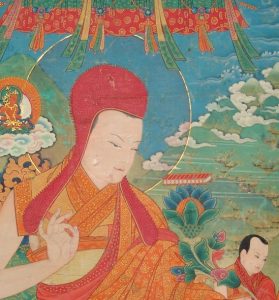
Several years ago, at the end of one of Professor Richard Gombrich’s seminars in Hong Kong, he was asked a question from several members of the public. They were curious to know how someone could devote their professional lives to a religion they did not believe in. He has stated in most of his books and at the start of many lectures that he is not a Buddhist, despite admiring Buddhism. Why, then, should he feel at all passionate about Buddhist Studies?
I believe this question fundamentally misunderstood the nature of a scholar’s calling to research and study for its own sake. It was asked with good intentions, but seemed to assume that Prof. Gombrich couldn’t do much good for the Dharma as a non-Buddhist academic. This is obviously not the case. Aside from his primary academic roles as Emeritus Fellow at Oxford’s Balliol College and Boden Professor of Sanskrit Emeritus, he was the former President of the UK Association of Buddhist Studies and the Founder-President of the Oxford Center of Buddhist Studies. These credentials seem more than sufficient to validate his sincerity in increasing his students’ knowledge and understanding of Buddhism.

Whether one agrees or disagrees (perhaps vehemently) with the conclusions of his research and translations, it can only be good that a non-Buddhist would be willing to devote their professional academic life to a religion they admire. We sat down at his hotel’s café to catch up on his recent thoughts on Buddhism, and it quickly became obvious that his thinking and research can’t be bundled into a category within the discredited dichotomy of “scholar” versus “practitioner.”
As one of the more recognizable names in Buddhology, he was not embarrassed to reflect that the steady flourishing of his distinguished career was thanks to the sheer lack of interest in his field. “There was no competition,” he laughed. “Who would have thought that by choosing to do Sanskrit, I’d just walk into a job—because I was the only candidate! I’ve had the extraordinary experience of having a satisfactory career in worldly terms without having done one job interview.”
He conceded that Buddhist Studies graduates have a much more difficult time now, for the very same reason he found job security in the old days. When comparing Britain with other major centers of Western learning like Germany or France, he remains convinced that it is only in the United States that Buddhist Studies is flourishing. “That’s simply just because they’re several times richer than the rest of us,” he said wryly. “In Germany, if you look to the last quarter of a century or so, post after post has been closed and they aren’t replaced. The same goes for France and Holland. Italy never had any Buddhological professorships, and so on. Before I retired in 2004, I interviewed some people who wanted to do graduate studies. I remember vividly an American and an Italian who were very promising students and I was keen to take them as students. But it was impossible. Even we at Oxford had no scholarships, and like most people in the world, these were not rich individuals. So they ended up in California.”
He sighed, “Even at Oxford, one has to be immune to discouraging trends in Buddhist Studies. You battle on.”
One complaint commonly thrown at academics is their lack of interest in contemporary issues that have a real impact on Buddhists today. Prof. Gombrich cannot be accused of this thanks to his deep involvement in matters like the ordination of women in Theravada Buddhism. He had this to say on the issue: “Don’t underestimate this. This is still a hot potato—very, very hot indeed. The Thais are particularly vociferous about forbidding women.” Based on personal experience, Prof. Gombrich provided a fascinating glimpse into the conflict behind the curtain. “Now there’s open war between the reformists and the Thai patriarchs. I tried to raise the issue of women’s ordination at a big conference in Thailand seven or eight years ago, when there was a huge conclave of seven to eight thousand attendees. They said they were going to discuss the position of women in Buddhism. But they were more or less platitudes, verbal gestures, and then I asked them if we could talk about ordaining women in Thailand. ‘No we can’t. Shut up!’ was the reaction—an unmentionable subject! But Buddhism urges us to accept the things that cannot be altered, and this is applicable to those whose minds we cannot change.”
Nevertheless, he feels confident that history will vindicate more broad-minded thinkers. “There’s a fortunate coincidence, shall we say, between what liberal-minded people think and what accurate historical analysis shows,” he insisted. “There is no justification for keeping women out. I think that people who want to allow women to ordain will win. But it will take a long time. There is a huge amount of resistance, particularly in the Thai sangha.” He is interested in the Chinese tradition of Humanistic Buddhism for this reason: “Fo Guang Shan, whatever its defects, has taken the lead in promoting the ordination of women.”
Prof. Gombrich also pays close attention to the declining numbers of monastics in East Asia, which may have severe ramifications for traditional Buddhist settings in the Sinophone world. “I don’t think there’s any real structural reason as to the growing lack of monks, but one basic, age-old reason is probably that Chinese families aren’t keen on seeing their sons leaving the home,” he said. “There simply aren’t many sons who can enter into this vocation. There’s no accurate census of the sangha in Taiwan, but a recent book by Elise Anne DeVido [Taiwan’s Buddhist Nuns: SUNY Press, 2010] estimates that 90 per cent of ordained personnel in the country are women, which is unlike any Buddhist country.” For the professor, Taiwan’s developments, such as Venerable Zhao Hui’s blessing of a lesbian marriage in August 2012, appear to represent the exact opposite of Thailand’s sangha. Where most of Thailand’s monastic institution appears terrified of change, Taiwan’s nuns and monks are opening an exciting doorway of opportunities for Buddhist acclimatization to the unpredictable 21st century.
Prof. Gombrich is primarily known as a scholar who has contributed prolifically to modern Buddhist Studies. But his interests in the Buddhist story are much more complex. His long career is evidence that “bracketing out” your personal beliefs (or in his case, lack thereof) in the study of religion is achievable. But it also highlights how he has furthered the study of Buddhism in ways many devout Buddhists can only dream of.












